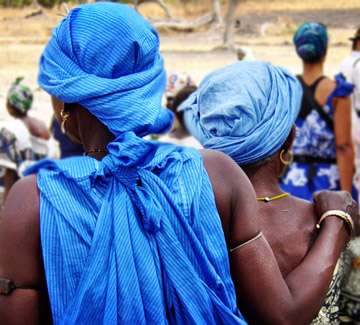My Senegalese Cousin, the Rice-Loving Pig
Travel Stories: When the woman selling peanuts at a Samba Dia market learned the Senegalese name adopted by Katie Krueger, negotiations took an insulting turn
07.15.08 | 11:53 AM ET
 Photo by Katie Krueger.
Photo by Katie Krueger.Stretching my legs after a cramped bus ride from M’bour, Senegal, I waited for the porter to throw my backpack down from the roof. I had a bus transfer in the small village of Samba Dia on my way to the Sine Saloum Delta. I was in search of ripe mangoes and lush mangroves, or things that would help me forget how far I was from my family back home in Wisconsin.
I looked around the village bus depot, a dusty field lined with boutiques and filled with groups of juice sellers waiting for the next bus arrival. I strolled up and down aisles of vendors who were squatting next to their goods. Faded second-hand T-shirts folded in piles three feet high. Banana bunches reaching from the vendors’ mats like hands with dozens of edible yellow fingers. Multicolored plastic buckets and tea kettles. Sticky pyramids of red and green mangoes, their leaking nectar glistening in the afternoon sun.
Finally, I found what I was looking for: an old woman sitting on an overturned wooden crate selling peanuts. She had about 40 plastic bags, each holding handfuls of either plain or sugarcoated nuts. Her head was wrapped in fluorescent pink fabric, folded like a crown. Grey hair peeked out at her temples. She was chewing on a neem branch, a favorite toothbrush of many rural Senegalese. When we started to talk, she did not take it out but rather pushed it to the corner of her mouth, where it bounced with her every word.
I greeted her in Wolof, eager to practice. Three days of navigating from one small town to the next had improved my language skills more than three months of classroom lessons.
I asked about her family, asked if she felt at peace, and then we both praised God. Eventually, I got around to asking her how much the peanuts cost.
My Wolof was not native enough to avoid getting quoted the toubab, or foreigner, price. I decided to bargain with her Senegalese-style: taking my time with friendly small talk.
She asked my Senegalese name.
“Kuumba N’dour,” I replied. By sharing my adopted last name, I was revealing that I belonged to the Sereer, one of the dozens of ethnic groups in Senegal. I knew that if she were also Sereer, I would have no problem negotiating. The Senegalese believe in solidarity.
“What a terrible name,” she said with a straight face. “You must be very stupid.”
Without flinching, I asked her name.
“N’daiye Diatta.”
Her last name told me that she was Joola, another of the tribes. In fact, the Joola are considered cousins of the Sereer.
I looked her straight in the eye. “Joola?” I asked, raising an eyebrow. “You are selfish and love to eat rice, you pig. Begg nga cebb.”
The two vendors on either side of her had been listening with disinterest. At that moment, though, they burst out laughing, repeating what I had said.
“Kuumba N’dour. Begg na cebb.” One of the women slapped her knee as she laughed.
Other vendors on the periphery strolled over to check out the commotion. As I tried to reassure myself that I’d said the right word for pig, my hands grew clammy, and I became aware of the circle of strangers closing in around me.
The peanut vendor had not smiled once. She still looked stone cold, the neem stick dangling out of the corner of her mouth.
“Begg na cebb?” she asked. “I like rice? I don’t think so. You,” she said, pointing at me. “You are my slave and I know you spend all day eating peanuts.” At this point, the growing crowd around me erupted in laughter. The woman smiled, and with relief, I started laughing, too.
As members of cousin ethnic groups, the Joola and Seerer, we were “joking cousins.” This means that whenever we meet, as a sign of friendliness, we insult each other without hesitation. Every ethnic group in Senegal has at least one or two joking cousin groups, so meeting one is rare enough to be a delight but common enough that it is protocol.
Once everyone surrounding us settled down, she sold me the peanuts for half the original asking price.
“Kuumba N’dour,” she said. “Come eat dinner with my family tonight.”
I thanked her and said I would the next time. As I settled into my bus seat and waved goodbye, I felt like I was not so far from family after all.![]()